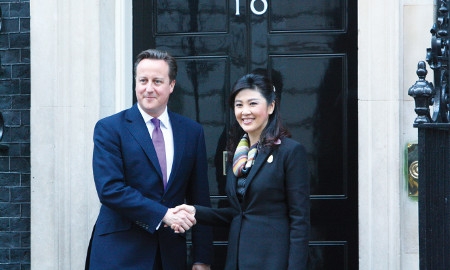The businesswoman-turned-politician’s relatively youthful age of 45 made her the country’s youngest leader for more than 60 years, immediately resulting in an injection of fresh new life and promise into the nation and its governance.
Through her sincere campaign for “national reconciliation” – a direct reaction to the prolonged political turmoil which increasingly spiralled in the years following a military coup that ousted her brother Thaksin’s administration – Mrs Shinawatra has successfully begun to win back the trust of the Thai people, maintaining social and economic stability and now the revitalisation of bilateral relations with the United Kingdom.
Good dealings between the countries, however, are not an entirely new affair. Well before Mrs Shinawatra made her first official visit as PM to British shores in November 2012, there had already existed a special, long-standing relationship that has embodied the two nations’ robust ties for over 50 years. King Bhumibol of Thailand and the UK’s own Queen Elizabeth II share not only the position of heading the world’s two longest reigning monarchies, but a lifelong friendship to go with it, dating back to King Bhumibol’s visit to the UK in 1960 when both sovereigns affirmed their mutual respect and admiration for each other’s cultures, vowing to bind them closer.
It appears that now, in taking heed of the continued royal amity and their non-forgotten pledge, the nations’ current political leaders are intent on pursuing an entirely different relationship of their own. As a result of Mrs Shinawatra’s mission to Westminster last winter, an unprecedented agreement was made with the Cameron administration over the establishment of a Strategic Dialogue that will act as a “high-level, consultative forum to set and monitor the future of bilateral cooperation in all areas”.
The new mechanism for communication is expected to bring a regular platform for both countries to exchange views on various matters of mutual interest, aimed at intensifying the already healthy relations and sparking a number of new socioeconomic initiatives and projects in the areas of trade and investment, tourism, education and defence, as well as serve as a vital arena in the exchange of innovational knowledge.
Economically speaking, there has long been a strong and active presence of the British private sector in Thailand, which in turn has resulted in significant contributions to its GDP growth, and seen the UK become one of its largest international trading partners and a top foreign investor. Now with Thai companies also expressing their wish to expand their investments in Britain, the inaugural bilateral Strategic Dialogue has already witnessed immediate positive developments. While optimistic negotiations over the proposed Thailand-EU Free Trade Area were made, both governments also outlined an ambitious target of doubling two-way trade by 2018, indicating a productive and exciting time ahead.
Thailand is certainly a formidable partner in these troubled economic times. Amid Europe’s sovereign debt crisis and a faltering global economy, Thailand’s GDP grew at an all time high of 18.9 per cent year-on-year in the final quarter of 2012. Overall the Thai economy expanded by 6.3 per cent last year, a figure rendered all the more impressive considering 2011’s feeble increase of just 0.1 per cent, when the worst floods in almost 70 years swamped most of the country.
In the past few years, Thailand has witnessed marked progress in its socio-economic development, and despite the political challenges it has suffered in recent times, the country has become a real success story of emerging nations, sustaining economic growth and large poverty reduction to go with it.
Indeed, there seems to be a certain steely nature behind the country cheerfully known as the “Land of Smiles”, with the place certainly no stranger to making remarkable recoveries. Having been one of the world’s fastest growing economies during the early 1990s, the Asian financial crisis hit in 1997, only for the nation to grit its teeth and grow steadily once again following the turn of the millennium.
In its latest resurgence – bouncing back not only from the continued after-effects of the recent global financial meltdown and the devastating 2011 floods, but also the political turmoil that severely hampered national progress late last decade – Thailand has really drawn attention to the quite astonishing robustness of its economy.
Now, under the leadership of Mrs Shinawatra, the Thai government is boosting spending to support growth, opening up the economy to greater foreign investment and seeking to develop deeper links with the rest of the developed world, not only in trade, but in the sharing of innovation, technology and design. And Thailand’s location at the heart of the upcoming ASEAN Economic Community (AEC), which will be inaugurated in 2015, makes it the ideal springboard to the new union’s market of more than 600 million people.

0 COMMENTS